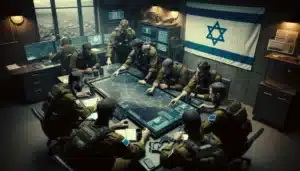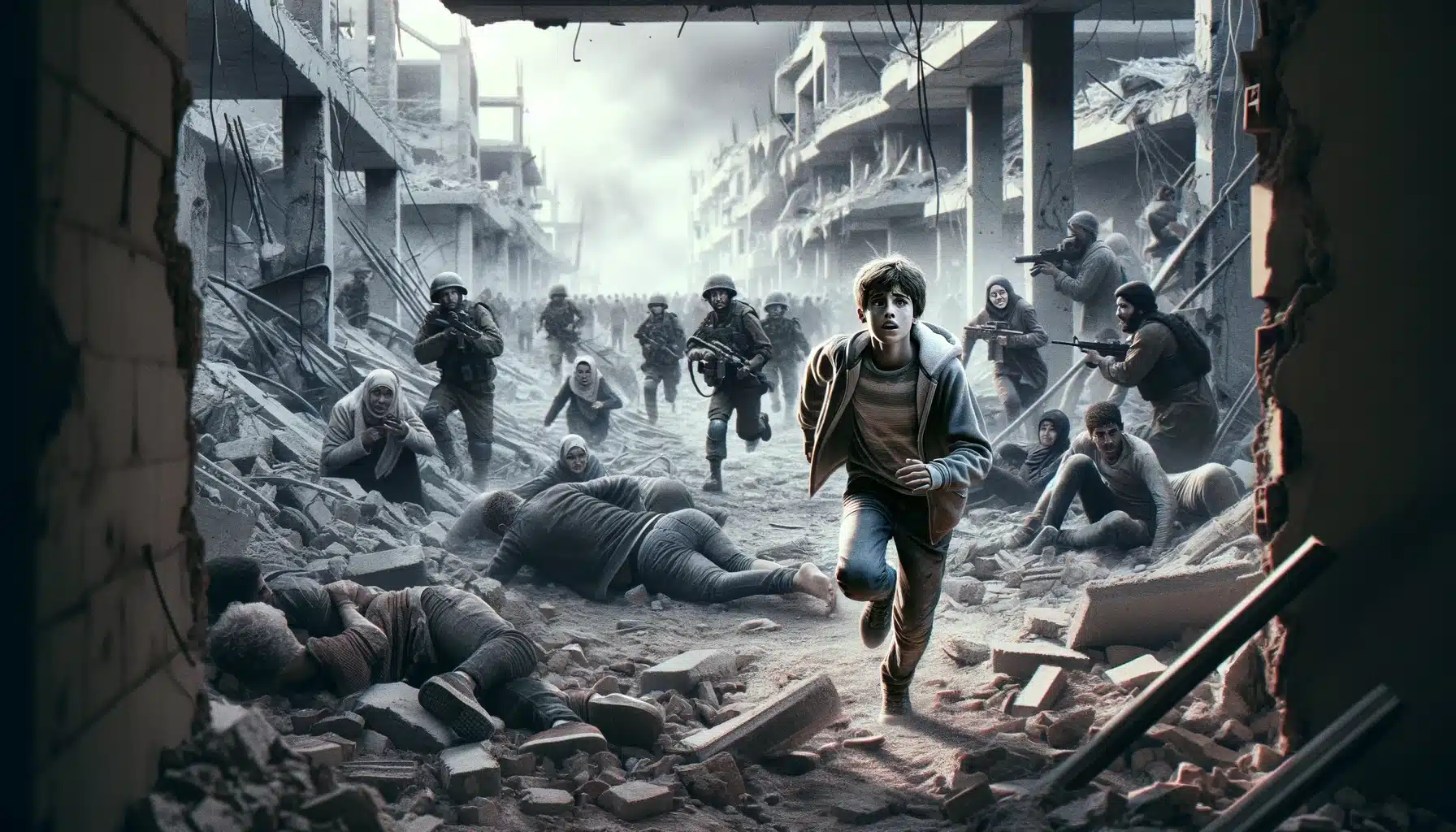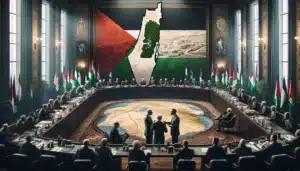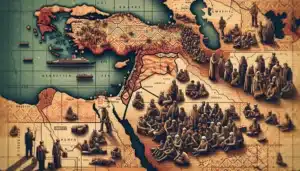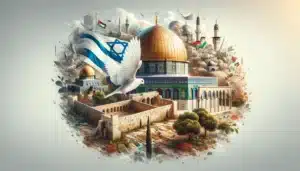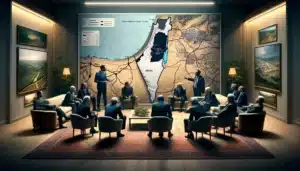Overview of the Israeli-Palestinian Conflict
The Israeli-Palestinian conflict has been one of the most enduring and complex geopolitical issues of the past century. Rooted in a long history of territorial disputes, religious significance, and national identity, this conflict has led to repeated cycles of violence, negotiation, and temporary resolutions that have not yet culminated in a lasting peace. The signing of the Oslo Accords in the early 1990s, detailed at Geopolitics Journal’s exploration of the Oslo Accords from 1993 to 2024, marked a significant attempt at peace but has not resolved the core issues at the heart of the conflict.
Current Humanitarian Crisis in the Israeli-Palestinian Conflict
Today, the humanitarian crisis in the Israeli-Palestinian conflict is more pronounced in the Gaza Strip, but also deeply affects the West Bank. The blockade of Gaza, imposed by Israel with the stated aim of preventing the militant group Hamas from arming, has severely restricted the flow of goods and services into the area, exacerbating the humanitarian situation.
Health Concerns Amidst the Crisis
The health sector in Gaza has been particularly hard-hit. Hospitals and medical facilities are overwhelmed by the needs of the population, which include not only trauma care from the ongoing conflict but also the basic health services complicated by the blockade. According to a report by Johns Hopkins Bloomberg School of Public Health, the blockade has led to shortages in medical supplies, power outages affecting hospital operations, and a significant impact on water quality, raising the risk of waterborne diseases.
Health Concerns in Gaza:
- Trauma and injury due to bombings and military operations
- Chronic diseases going untreated due to lack of medication
- Mental health issues exacerbated by the conflict and living conditions
- Maternal and neonatal health services struggling to operate effectively
- Risk of epidemics, particularly of waterborne diseases like cholera
International Response and Humanitarian Aid
The international community has responded to the crisis with a combination of humanitarian aid and political pressure. The United Nations, through agencies like UNRWA, has been active on the ground, providing emergency assistance to civilians affected by the crisis. However, as outlined by UN News, the blockade has made it challenging to deliver aid effectively, and the destruction of infrastructure, including UN facilities, has hampered these efforts.
Efforts by International Agencies:
- UNRWA: Sheltering displaced families, distributing food, and providing emergency medical services
- WHO and ICRC: Supplying medical supplies and equipment
- WFP: Coordinating the distribution of food to displaced populations
Despite these efforts, the underlying political issues remain unresolved, necessitating a continued international focus on reaching a sustainable solution to the conflict.
Role of Political and Military Actions
Political and military actions have significantly influenced the humanitarian situation. Israeli military efforts, like airstrikes and blockades, seek to stop threats but result in civilian harm and damage to structures. On the other hand, rocket attacks from Hamas and other groups into Israeli areas increase conflict and distress for all involved.
International and Regional Efforts Towards Resolution
The international community has made various efforts to mediate peace, including the Abraham Accords brokered by the Trump administration, which saw normalization of relations between Israel and several Arab states. Despite these diplomatic advances, detailed at GeopoliticsJournal’s review of the Abraham Accords in 2024, the core issues of the Israeli-Palestinian conflict remain unaddressed, underscoring the complexity of achieving a lasting peace.
Looking Forward: Pathways to Peace and Stability
The path to resolving the humanitarian crisis in the Israeli-Palestinian conflict involves addressing the underlying political issues. The two-state solution, as discussed at GeopoliticsJournal’s analysis on its viability today, remains a contentious and elusive goal. Nonetheless, efforts towards peace must continue, with a focus on diplomatic engagement, respect for human rights, and international cooperation to rebuild and stabilize the affected regions.
Role of Political and Military Actions
The ongoing conflict between Israel and Palestine is marked by a series of political and military actions that have profound implications on the ground. Israel’s strategic airstrikes and the blockade of Gaza aim to deter Hamas’s military capabilities but also exacerbate the humanitarian situation for civilians. This complex scenario includes:
- Israeli airstrikes and blockades: Aimed at neutralizing threats but resulting in significant civilian casualties and infrastructure damage.
- Militant actions by Palestinian groups: Including rocket attacks into Israeli territory, further escalating tensions and humanitarian distress.
Expanding Israeli Settlements
The expansion of Israeli settlements in the occupied territories continues to be a contentious issue, fueling tensions and hindering the peace process. This aspect, thoroughly examined in GeopoliticsJournal’s insights on Israeli settlement expansion, highlights the complexities surrounding territorial disputes and the quest for sovereignty.
Impacts of Settlement Expansion
- Increased tensions between communities
- Displacement of Palestinian populations
- Obstacles to peace negotiations and a two-state solution
International and Regional Efforts Towards Resolution
Efforts to mediate peace and resolve the conflict are ongoing, with various international and regional actors playing key roles. The Abraham Accords, despite not directly addressing the Israeli-Palestinian conflict, signify a shift in regional dynamics and offer a new context for future negotiations.
Main International Efforts
- United Nations initiatives: Aimed at providing humanitarian relief and facilitating dialogue.
- The Abraham Accords: Although not directly solving the conflict, create new diplomatic ties and potential for future peace negotiations.
- European Union and United States mediation: Both have historically played roles in attempting to broker peace agreements.
Humanitarian Efforts and Challenges
The humanitarian efforts to alleviate the crisis in Gaza and the West Bank face significant challenges due to the blockade, access restrictions, and ongoing hostilities. Key organizations like UNRWA and WHO strive to deliver essential services amidst these constraints.
Table: Challenges and Responses in Humanitarian Aid
|
Challenge
|
Response
|
Impact
|
|
Blockade of Gaza
|
UNRWA’s provision of food and medical aid
|
Mitigates immediate needs but long-term sustainability is questionable
|
|
Infrastructure damage
|
WHO and other NGOs’ health services
|
Addresses urgent health concerns but overwhelmed by scale of needs
|
|
Access restrictions
|
International diplomatic pressure
|
Seeks to ease restrictions but often met with limited success
|
Looking Forward: Pathways to Peace and Stability
The path towards peace is fraught with challenges but remains an essential pursuit for regional and international stakeholders. Emphasizing dialogue, mutual respect, and the recognition of each other’s right to exist and prosper is crucial. The discussion on the viability of a two-state solution, as seen in GeopoliticsJournal’s analysis, remains central to any long-term resolution strategy.
In sum, addressing the humanitarian crisis in the Israeli-Palestinian conflict demands a diverse strategy. It must meet urgent needs and aim for lasting peace. Global unity, clever diplomacy, and a dedication to rights and justice are key. They are vital for Israelis and Palestinians to surmount persistent challenges.
Navigating Towards Resolution
Achieving a sustainable resolution to the Israeli-Palestinian conflict requires a multi-dimensional approach. This entails addressing the immediate humanitarian needs of the affected populations while also tackling the root causes of the conflict through diplomatic and political means. The Oslo Accords, as discussed in GeopoliticsJournal’s retrospective analysis, represent a historical attempt at peace that, despite its shortcomings, offers lessons for future negotiations.
The Role of International Diplomacy
International diplomacy remains a cornerstone in the quest for peace. The engagement of global powers and regional actors can facilitate dialogue and offer frameworks for negotiations. Here, the importance of unbiased mediation cannot be overstated, as it ensures that all parties feel heard and valued in the peace process.
Strengthening Humanitarian Support
To mitigate the humanitarian crisis, there must be an emphasis on strengthening and expanding the support provided by international organizations. This involves not only addressing the immediate needs, such as food, medical aid, and shelter, but also focusing on long-term developmental support to rebuild the affected communities.
The Path Forward
Looking forward, the path to peace involves several key steps:
- Enhanced International Cooperation: Leveraging global and regional partnerships to facilitate a comprehensive peace process.
- Support for Civil Society: Empowering local communities and civil society organizations to participate in the peace-building process.
- Investment in Infrastructure: Rebuilding and developing infrastructure to improve living conditions and foster economic growth.
- Focus on Education and Dialogue: Promoting education initiatives that encourage dialogue and understanding between Israeli and Palestinian communities.
Conclusion
As we reach the end of our in-depth look at the humanitarian crisis in the Israeli-Palestinian conflict, we recognize that the journey toward peace is complex and challenging. Nonetheless, by adopting a comprehensive strategy that marries humanitarian assistance with political dialogue and global diplomatic efforts, there is a beacon of hope for a harmonious future where Israelis and Palestinians may coexist in tranquility and safety. The enduring nature of this conflict calls for resilience, empathy, and an unwavering commitment to justice and human rights. As the international community continues to navigate these troubled waters, the lessons learned from past efforts and the ongoing challenges must inform our approach to building a lasting peace in the region.
This comprehensive analysis urges policymakers, humanitarian organizations, and global citizens to unite in tackling this prolonged conflict. Indeed, with more informed dialogue, we can pave the way for empathetic aid and strategic diplomacy. Moreover, intensified efforts can change today’s harsh reality into a lesson for the future. They can turn the humanitarian crisis in the Israeli-Palestinian conflict into history. This paves the way for a peaceful tomorrow.
